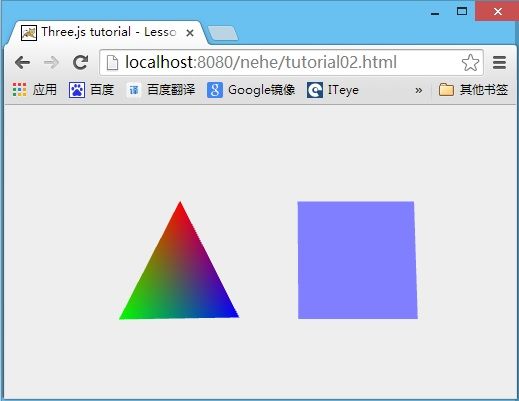- WebGPU实战:Three.js性能优化新纪元
AWS官方合作商
javascript服务器开发语言
一、WebGPU技术突破解析1.1传统WebGL的架构瓶颈graphLRA[JavaScript]-->B[WebGLBinding]B-->C[OpenGLES]C-->D[GPUDriver]D-->E[GPUHardware]1.2WebGPU的现代架构优势graphLRA[WGSLShader]-->B[ComputePipeline]A-->C[RenderPipeline]B-->D[
- WEBGL 2D游戏引擎研发系列 第二章 <显示图片>
小鬼编程
游戏web开发webglhtml5html5游戏开发扩展游戏2dhtml5前端游戏开发
WEBGL2D游戏引擎研发系列第二章~\(≥▽≤)/~HTML5游戏开发者社区(群号:326492427)转载请注明出处:http://html5gamedev.org/目录HTML52D游戏引擎研发系列第一章HTML52D游戏引擎研发系列第二章HTML52D游戏引擎研发系列第三章HTML52D游戏引擎研发系列第四章HTML52D游戏引擎研发系列第五章HTML52D游戏引擎研发系列第六章HTML5
- Three.js世界中的三要素:场景、相机、渲染器
Front_Yue
3D技术实践指南javascriptthree.js3d
一、Three.js简介Three.js是一个基于WebGL的JavaScript库,它允许开发者在网页上创建和显示复杂的3D图形和动画,而无需用户安装任何额外的插件或软件。Three.js在Web开发中的地位非常重要,它通过提供简单直观的API,极大地降低了3D图形开发的门槛,使得开发者可以更专注于实现创意。Three.js广泛应用于游戏开发、虚拟现实、数据可视化、艺术创作等多个领域。二、场景:
- GIS三维可视化进阶:Three.js集成Cesium引擎实现全球地形LOD与OGC标准服务调用
贝格前端工场
javascript开发语言ecmascript
Three.js与Cesium引擎基础介绍Three.js是一款基于JavaScript的开源三维图形库,它提供了丰富的API用于创建和操作三维场景、物体、材质等。在Web端的三维可视化领域应用广泛,因其能够在浏览器中高效渲染复杂的三维模型和场景,大大降低了开发人员创建三维交互内容的门槛。通过简单的代码,即可实现如创建三维几何体(立方体、球体等)、为物体添加材质(如纹理材质、光照材质)以及设置相机
- WebGL开发:BabylonJS从入门到精通(下卷)
莲华君
前端权威教程合集WebGL系统化学习webgl
全书卷目:WebGL开发:BabylonJS从入门到精通(上卷)WebGL开发:BabylonJS从入门到精通(下卷)目录第一部分:基础篇——构建3D世界的基石第一章:BabylonJS概述与环境搭建什么是BabylonJS:WebGL宇宙的创世引擎BabylonJS的历史与优势:开源利剑的进化史安装与配置开发环境:3D工匠的工坊搭建术使用BabylonJSPlayground与本地开发环境浏览器
- 探究Three.js中模型移动与旋转的交互逻辑
Front_Yue
3D技术实践指南javascriptthree.js3d
前言Three.js作为一个功能强大的JavaScript3D库,极大地简化了在网页上创建和展示3D图形的过程。它在游戏开发、产品展示、虚拟现实等众多领域都被广泛应用。通过Three.js,开发者能够轻松创建出复杂的三维场景和交互性强的3D应用,为用户带来沉浸式的体验。一、模型移动的交互逻辑实现(一)键盘控制模型移动利用键盘事件来控制模型在三维空间中的位置移动,是一种常见且便捷的交互方式。以下为具
- 使用Three.js渲染器创建炫酷3D场景
Front_Yue
3D技术实践指南javascriptthree.js3d
引言在当今数字化的时代,3D图形技术正以其独特的魅力在各个领域掀起波澜。从影视制作到游戏开发,从虚拟现实到网页交互,3D场景以其强烈的视觉冲击力和沉浸式的体验,成为了吸引用户、传达信息的重要手段。而Three.js,作为一款功能强大且广受欢迎的JavaScript3D库,为我们提供了便捷、高效的途径来创建令人炫目的3D场景。本文将深入探讨使用Three.js渲染器创建炫酷3D场景的方方面面,带领读
- 使用Three.js渲染器创建炫酷3D场景
引言在当今数字化的时代,3D图形技术正以其独特的魅力在各个领域掀起波澜。从影视制作到游戏开发,从虚拟现实到网页交互,3D场景以其强烈的视觉冲击力和沉浸式的体验,成为了吸引用户、传达信息的重要手段。而Three.js,作为一款功能强大且广受欢迎的JavaScript3D库,为我们提供了便捷、高效的途径来创建令人炫目的3D场景。本文将深入探讨使用Three.js渲染器创建炫酷3D场景的方方面面,带领读
- 【AI大模型应用开发】RAG-Fusion框架:忘掉 RAG,未来是 RAG-Fusion
同学小张
大模型人工智能笔记chatgptagiembeddingRAGprompt
大家好,我是同学小张,+v:jasper_8017一起交流,持续学习C++进阶、OpenGL、WebGL知识和AI大模型应用实战案例,持续分享,欢迎大家点赞+关注,共同学习和进步。RAG目前很火,但是也有一些不足的地方。有不足就有改进方法。本文我们来看一个方法:RAG-Fusion,理解其原理,并看一下其实现源码。文章目录0.RAG的不足1.RAG-Fusion原理概述2.步骤拆解与代码示例2.1
- 使用 WebP 优化 GPU 纹理占用
泫凝
javascript前端
WebP格式相比JPEG/PNG文件更小,可以减少GPU纹理内存占用,提高WebGL/Three.js/3D渲染的性能。为什么WebP能减少GPU内存占用?文件更小→WebP比JPG/PNG压缩率更高,减少纹理上传带宽,提高渲染速度。支持透明度(RGBA)→比PNG更小,适用于UI贴图/透明纹理。减少Mipmaps体积→WebP生成的mipmap纹理占用的GPU内存更少。⚠️但WebP仍然是8-b
- 指纹浏览器:隐私保护利器与技术实践指南——从身份隐匿到多账号管理的核心解析
Hotlogin
前端
一、浏览器指纹:数字身份追踪的底层逻辑浏览器指纹通过收集设备参数(如Canvas渲染特征、字体列表、WebGL硬件信息等)生成用户唯一标识,无需Cookie即可实现精准追踪。根据EFF研究,其识别准确率可达90%以上。▶核心技术解析Canvas指纹:不同设备的抗锯齿算法差异生成唯一哈希值,成为主流追踪手段WebGL指纹:提取GPU驱动版本等硬件信息,构建设备画像环境参数交叉验证:时区、屏幕分辨率、
- 《突破性能瓶颈,用 Rust + WASM 实现浏览器端FFT加速300%实战》
煜bart
人工智能机器人
引言:当JavaScript遇上硬核计算**“为什么我的音频分析页面卡到崩溃?”这是前端工程师在实现实时频谱可视化时最常见的噩梦。传统JavaScript的FFT计算在万级数据点时就会引发严重卡顿,但今天我们将用**Rust+WebAssembly**的组合拳,在浏览器中实现**零依赖、300%加速的傅里叶变换**。无需WebGL黑魔法,直接上硬核代码!---###**一、血腥现场:JS的Type
- 学习threejs,dds格式图片文件贴图
2301_81121233
学习贴图pythontornadoflaskscikit-learnplotly
要在Three.js中使用DDS格式的图片文件作为贴图,你需要加载和解析该文件,并将其应用于你的模型或材质。首先,确保你已经引入了DDSLoader.js文件,它是Three.js的一个扩展插件,用于加载和解析DDS格式的图片文件。然后,创建一个新的DDSLoader实例,并使用它来加载DDS图片文件。varloader=newTHREE.DDSLoader();loader.load('path
- Cesium:开源的三维地球可视化引擎
ZD1
信息可视化
简介:Cesium是一款开源的三维地球可视化引擎,为开发者和用户提供了强大且易于使用的工具,用于创建令人惊叹的虚拟地球场景。它基于WebGL技术,能够在现代的Web浏览器上运行,并支持各种平台和设备。本文将详细介绍Cesium的特点和应用领域。特点:a.高性能:Cesium利用GPU加速和流式处理技术,能够处理大规模的地理数据,并实时渲染出逼真的三维地球场景。b.开放性:Cesium是一个开源项目
- Cesium在三维模型中的应用
IT邦少
前端贴图
Cesium在三维模型中的应用Cesium简介Cesium介绍Cesium是一个跨平台,跨浏览器的展示三维地球和地图的javascript库Cesium使用WebGL来进行硬件加速图形,使用时不需要任何插件支持,但是浏览器必须支持WebGLCesium是基于Apache2.0许可的开源程序,它可以免费的用于商业和非商业用途Cesium特点支持2D,2.5D,3D形式的地图展示可以绘制各种几何图形,
- Cesium-三维地球可视化应用
程序员_三木
Web3dwebglThree.js
什么是CesiumJS?CesiumJS是一个强大的开源JavaScript库,用于构建高性能的3D地图和地球可视化应用。无论你是从事地理信息系统(GIS)开发、数据可视化,还是需要展示空间数据,CesiumJS都能提供灵活的解决方案。它以WebGL为核心,专注于大规模地理空间数据的实时渲染。CesiumJS是Cesium平台的核心部分,与Cesiumion等服务无缝集成,支持从数据管理到可视化的
- Three.js 阴影 (Shadow) 知识点整理
泫凝
javascriptthree.jsnpm前端
阴影主要由castShadow和receiveShadow控制,并通过不同类型的光源(DirectionalLight、SpotLight、PointLight)生成。我们将系统地整理与阴影相关的知识点。1️⃣基础概念castShadow:物体是否投射阴影。receiveShadow️:物体是否接收阴影。renderer.shadowMap.enabled=true✅:全局开启阴影渲染。rende
- 【前端拓展】Canvas性能革命!WebGPU + WebAssembly混合渲染方案深度解析
爱上大树的小猪
前端js
为什么需要混合方案?真实场景痛点分析:传统WebGL在高频数据更新时存在CPU-GPU通信瓶颈JavaScript的垃圾回收机制导致渲染卡顿复杂物理模拟(如SPH流体)难以在单线程中实现技术选型对比:graphLRA[计算密集型任务]-->B[WebAssembly]C[图形渲染任务]-->D[WebGPU]B-->E[共享内存]D-->E️环境搭建全流程1.WebGPU环境配置#启用Chrome
- webgl threejs 云渲染(服务器渲染、后端渲染)解决方案
allenjiao
Threejswebglthreejs云渲染后端渲染服务器渲染云流化三维云渲染
云渲染和流式传输共享三维模型场景1、本地无需高端GPU设备即可提供三维项目渲染云渲染和云流化媒体都可以让3D模型共享变得简单便捷。配备强大GPU的远程服务器早就可以处理密集的处理工作,而专有应用程序,用户也可以从任何个人设备查看全保真模型并与之交互。2、云流媒体实现多终端联动共享价值更高在项目应用场景中,在大屏、电脑、平板、手机和其它移动终端,可以实现多屏联动、远程协助,三维云流化让客户访问时可以
- Python, Springboot 开发基于人类指令生成机器人3D可视化动态模型app
Geeker-2025
pythonspringboot
开发一个基于人类指令生成机器人3D可视化动态模型的APP是一个复杂且多层次的项目,涉及前端和后端的多个技术栈。以下是一个高层次的设计概述,涵盖主要的技术栈和功能模块,并提供使用Python和SpringBoot进行联合开发的示例。##技术栈概述###前端-**框架**:React.js或Vue.js(用于构建用户界面)-**3D可视化**:Three.js或React-Three-Fiber(用于
- WebGPU 为什么会取代 WebGL,看看 WebGPU 都做了啥?
贝格前端工场
webglUI设计大数据
WebGPU被普遍认为是WebGL的继任者,并有望在未来逐步取代WebGL,这一趋势主要由以下技术、生态和行业因素推动,本文带着大家看WebGPU针对WebGL提升了啥,改进了啥。1.技术层面的必然性(1)硬件能力的演进需求现代GPU功能支持:WebGL基于OpenGLES(设计于2000年代初),无法利用现代GPU的并行计算、光线追踪、网格着色器等高级功能。WebGPU直接对接Vulkan/Me
- 指纹浏览器与代理IP的协同技术解析:从匿名性到防关联实现
Hotlogin
火云指纹浏览器指纹浏览器tcp/ip网络协议网络
一、技术背景与核心需求指纹浏览器通过模拟独立浏览器环境(包括User-Agent、Canvas指纹、WebGL参数等)实现多账号防关联,而代理IP通过隐藏真实IP地址提供网络匿名性。两者结合可解决以下技术痛点:双重身份隔离:单一指纹修改无法完全规避IP关联风险;动态环境模拟:代理IP支持地理位置切换,增强指纹浏览器模拟真实用户行为的能力;反检测能力提升:对抗网站基于IP黑名单或指纹追踪的风控策略。
- 造价算量审图多元化融合软件开发实战:技术架构与核心代码解析
夏末之花
架构
——从BIM模型解析到AI智能审图的完整实现路径1.技术架构设计该软件需融合以下模块:BIM/CAD模型解析引擎(支持Revit/DWG文件一键导入)智能算量核心算法(基于规则引擎与机器学习)协同审图平台(多人实时标注与版本控制)AI辅助决策系统(材料价格预测、工程量误差检测)技术栈推荐:前端:Three.js(3D模型渲染)+React(协同界面)后端:Python(算量算法)+Java(业务逻
- 9.3 智谱AI大模型生态爆发!中文准确率89.2%+代码生成67.3%,全面碾压GPT-4!
少林码僧
掌握先机!从0起步实战AI大模型微调打造核心竞争力人工智能语言模型gpt
智谱AI大模型生态爆发!中文准确率89.2%+代码生成67.3%,全面碾压GPT-4!1.WebGLM:联网检索增强大模型智谱AI于2022年推出的WebGLM是基于GLM-10B打造的检索增强生成(RAG)模型,其创新性地将大语言模型与搜索引擎深度整合,构建了独特的四阶段处理架构:
- 【threejs实战教程一】初识Three.js,场景Scene、相机Camera、渲染器Renderer
编码七号
数码相机javascript开发语言
Three.js是一个基于WebGL的JavaScript3D图形库,用于在浏览器中创建和显示3D内容Three.js中最基础的三个关键要素就是场景Scene、相机Camera、渲染器Renderer通俗一点理解,场景就是我们生活中一个具体的场景,比如自然环境中的一栋建筑,环境和内容构成了一个场景,相机就类比于人类的眼睛,渲染器就好比我们的中枢神经视觉处理器那我们的一个网页端3D场景就是把人类观察
- 14道web前端工程师面试题及答案解析
蚂蚁小搬运工
web前端
1.什么是HTML5?它有哪些新特性?答案:HTML5是HTML的第五个版本,引入了很多新的语法和特性,如语义化标签、多媒体支持、Canvas、地理定位、离线存储等。2.什么是WebGL?它有什么作用?答案:WebGL是一种用于在浏览器中渲染3D图形的API。它可以在浏览器中展示流畅和高质量的3D游戏和应用程序。3.什么是Canvas?它有什么作用?答案:Canvas是一种HTML5标签,用于在浏
- Laya前端开源框架深度解析与实践应用
徐子贡
本文还有配套的精品资源,点击获取简介:Laya前端开源框架是一个高效的跨平台JavaScript库,专注于2D/3D游戏及互动应用开发。它利用WebGL引擎提供原生级别的性能,同时兼容包括老旧IE在内的广泛浏览器环境。Laya框架具备强大的组件系统、资源管理、易用性,以及丰富的社区资源支持。实时编译和多平台发布能力让开发更加高效。通过LayaYKFramework-master项目,开发者可以深入
- 为什么说Unity引擎支持跨平台
你一身傲骨怎能输
编程语言unity游戏引擎
Unity引擎支持跨平台的主要理由包括以下几点:多平台发布:Unity引擎允许开发人员使用相同的代码和资源来构建应用程序和游戏,并在多个平台上发布,包括Windows、Mac、Linux、iOS、Android、WebGL、PlayStation、Xbox等。这种跨平台发布的能力使开发人员能够将他们的应用程序和游戏带到更广泛的受众中。统一开发环境:Unity提供了一个统一的开发环境,使开发人员可以
- three.js 鼠标点击获取模型对象
lucky_zouzou
javascript开发语言ecmascript
three.js创建模型后,想要实现点击模型获取模型对象触发相应事件。可以使用它提供的APITHREE.Raycaster()https://threejs.org/docs/index.html?q=Raycaster#api/en/core/Raycaster//监听点击事件window.addEventListener('click',(event)=>{event.preventDefau
- three.js 在 webGL 添加纹理
belldeep
javascriptthree.jsjavascriptwebglthree.jsp5.js
在我们生成了3D设计之后,我们可以添加纹理使其更加吸引人。在webGL和p5.js中,可以使用gl.texImage2D()和texture()API来为形状应用纹理。使用webGL在webGL中,gl.texImage2D()函数用于从图像文件生成2D纹理。该函数接受许多参数,包括目标,细节级别,内部格式,图像的宽度和高度,以及图像数据的格式和类型。为了方便,我将使用vite搭建一个原生js项目
- Dom
周华华
JavaScripthtml
<!DOCTYPE html PUBLIC "-//W3C//DTD XHTML 1.0 Transitional//EN" "http://www.w3.org/TR/xhtml1/DTD/xhtml1-transitional.dtd">
<html xmlns="http://www.w3.org/1999/xhtml&q
- 【Spark九十六】RDD API之combineByKey
bit1129
spark
1. combineByKey函数的运行机制
RDD提供了很多针对元素类型为(K,V)的API,这些API封装在PairRDDFunctions类中,通过Scala隐式转换使用。这些API实现上是借助于combineByKey实现的。combineByKey函数本身也是RDD开放给Spark开发人员使用的API之一
首先看一下combineByKey的方法说明:
- msyql设置密码报错:ERROR 1372 (HY000): 解决方法详解
daizj
mysql设置密码
MySql给用户设置权限同时指定访问密码时,会提示如下错误:
ERROR 1372 (HY000): Password hash should be a 41-digit hexadecimal number;
问题原因:你输入的密码是明文。不允许这么输入。
解决办法:用select password('你想输入的密码');查询出你的密码对应的字符串,
然后
- 路漫漫其修远兮 吾将上下而求索
周凡杨
学习 思索
王国维在他的《人间词话》中曾经概括了为学的三种境界古今之成大事业、大学问者,罔不经过三种之境界。“昨夜西风凋碧树。独上高楼,望尽天涯路。”此第一境界也。“衣带渐宽终不悔,为伊消得人憔悴。”此第二境界也。“众里寻他千百度,蓦然回首,那人却在灯火阑珊处。”此第三境界也。学习技术,这也是你必须经历的三种境界。第一层境界是说,学习的路是漫漫的,你必须做好充分的思想准备,如果半途而废还不如不要开始。这里,注
- Hadoop(二)对话单的操作
朱辉辉33
hadoop
Debug:
1、
A = LOAD '/user/hue/task.txt' USING PigStorage(' ')
AS (col1,col2,col3);
DUMP A;
//输出结果前几行示例:
(>ggsnPDPRecord(21),,)
(-->recordType(0),,)
(-->networkInitiation(1),,)
- web报表工具FineReport常用函数的用法总结(日期和时间函数)
老A不折腾
finereport报表工具web开发
web报表工具FineReport常用函数的用法总结(日期和时间函数)
说明:凡函数中以日期作为参数因子的,其中日期的形式都必须是yy/mm/dd。而且必须用英文环境下双引号(" ")引用。
DATE
DATE(year,month,day):返回一个表示某一特定日期的系列数。
Year:代表年,可为一到四位数。
Month:代表月份。
- c++ 宏定义中的##操作符
墙头上一根草
C++
#与##在宏定义中的--宏展开 #include <stdio.h> #define f(a,b) a##b #define g(a) #a #define h(a) g(a) int main() { &nbs
- 分析Spring源代码之,DI的实现
aijuans
springDI现源代码
(转)
分析Spring源代码之,DI的实现
2012/1/3 by tony
接着上次的讲,以下这个sample
[java]
view plain
copy
print
- for循环的进化
alxw4616
JavaScript
// for循环的进化
// 菜鸟
for (var i = 0; i < Things.length ; i++) {
// Things[i]
}
// 老鸟
for (var i = 0, len = Things.length; i < len; i++) {
// Things[i]
}
// 大师
for (var i = Things.le
- 网络编程Socket和ServerSocket简单的使用
百合不是茶
网络编程基础IP地址端口
网络编程;TCP/IP协议
网络:实现计算机之间的信息共享,数据资源的交换
协议:数据交换需要遵守的一种协议,按照约定的数据格式等写出去
端口:用于计算机之间的通信
每运行一个程序,系统会分配一个编号给该程序,作为和外界交换数据的唯一标识
0~65535
查看被使用的
- JDK1.5 生产消费者
bijian1013
javathread生产消费者java多线程
ArrayBlockingQueue:
一个由数组支持的有界阻塞队列。此队列按 FIFO(先进先出)原则对元素进行排序。队列的头部 是在队列中存在时间最长的元素。队列的尾部 是在队列中存在时间最短的元素。新元素插入到队列的尾部,队列检索操作则是从队列头部开始获得元素。
ArrayBlockingQueue的常用方法:
- JAVA版身份证获取性别、出生日期及年龄
bijian1013
java性别出生日期年龄
工作中需要根据身份证获取性别、出生日期及年龄,且要还要支持15位长度的身份证号码,网上搜索了一下,经过测试好像多少存在点问题,干脆自已写一个。
CertificateNo.java
package com.bijian.study;
import java.util.Calendar;
import
- 【Java范型六】范型与枚举
bit1129
java
首先,枚举类型的定义不能带有类型参数,所以,不能把枚举类型定义为范型枚举类,例如下面的枚举类定义是有编译错的
public enum EnumGenerics<T> { //编译错,提示枚举不能带有范型参数
OK, ERROR;
public <T> T get(T type) {
return null;
- 【Nginx五】Nginx常用日志格式含义
bit1129
nginx
1. log_format
1.1 log_format指令用于指定日志的格式,格式:
log_format name(格式名称) type(格式样式)
1.2 如下是一个常用的Nginx日志格式:
log_format main '[$time_local]|$request_time|$status|$body_bytes
- Lua 语言 15 分钟快速入门
ronin47
lua 基础
-
-
单行注释
-
-
[[
[多行注释]
-
-
]]
-
-
-
-
-
-
-
-
-
-
-
1.
变量 & 控制流
-
-
-
-
-
-
-
-
-
-
num
=
23
-
-
数字都是双精度
str
=
'aspythonstring'
- java-35.求一个矩阵中最大的二维矩阵 ( 元素和最大 )
bylijinnan
java
the idea is from:
http://blog.csdn.net/zhanxinhang/article/details/6731134
public class MaxSubMatrix {
/**see http://blog.csdn.net/zhanxinhang/article/details/6731134
* Q35
求一个矩阵中最大的二维
- mongoDB文档型数据库特点
开窍的石头
mongoDB文档型数据库特点
MongoDD: 文档型数据库存储的是Bson文档-->json的二进制
特点:内部是执行引擎是js解释器,把文档转成Bson结构,在查询时转换成js对象。
mongoDB传统型数据库对比
传统类型数据库:结构化数据,定好了表结构后每一个内容符合表结构的。也就是说每一行每一列的数据都是一样的
文档型数据库:不用定好数据结构,
- [毕业季节]欢迎广大毕业生加入JAVA程序员的行列
comsci
java
一年一度的毕业季来临了。。。。。。。。
正在投简历的学弟学妹们。。。如果觉得学校推荐的单位和公司不适合自己的兴趣和专业,可以考虑来我们软件行业,做一名职业程序员。。。
软件行业的开发工具中,对初学者最友好的就是JAVA语言了,网络上不仅仅有大量的
- PHP操作Excel – PHPExcel 基本用法详解
cuiyadll
PHPExcel
导出excel属性设置//Include classrequire_once('Classes/PHPExcel.php');require_once('Classes/PHPExcel/Writer/Excel2007.php');$objPHPExcel = new PHPExcel();//Set properties 设置文件属性$objPHPExcel->getProperties
- IBM Webshpere MQ Client User Issue (MCAUSER)
darrenzhu
IBMjmsuserMQMCAUSER
IBM MQ JMS Client去连接远端MQ Server的时候,需要提供User和Password吗?
答案是根据情况而定,取决于所定义的Channel里面的属性Message channel agent user identifier (MCAUSER)的设置。
http://stackoverflow.com/questions/20209429/how-mca-user-i
- 网线的接法
dcj3sjt126com
一、PC连HUB (直连线)A端:(标准568B):白橙,橙,白绿,蓝,白蓝,绿,白棕,棕。 B端:(标准568B):白橙,橙,白绿,蓝,白蓝,绿,白棕,棕。 二、PC连PC (交叉线)A端:(568A): 白绿,绿,白橙,蓝,白蓝,橙,白棕,棕; B端:(标准568B):白橙,橙,白绿,蓝,白蓝,绿,白棕,棕。 三、HUB连HUB&nb
- Vimium插件让键盘党像操作Vim一样操作Chrome
dcj3sjt126com
chromevim
什么是键盘党?
键盘党是指尽可能将所有电脑操作用键盘来完成,而不去动鼠标的人。鼠标应该说是新手们的最爱,很直观,指哪点哪,很听话!不过常常使用电脑的人,如果一直使用鼠标的话,手会发酸,因为操作鼠标的时候,手臂不是在一个自然的状态,臂肌会处于绷紧状态。而使用键盘则双手是放松状态,只有手指在动。而且尽量少的从鼠标移动到键盘来回操作,也省不少事。
在chrome里安装 vimium 插件
- MongoDB查询(2)——数组查询[六]
eksliang
mongodbMongoDB查询数组
MongoDB查询数组
转载请出自出处:http://eksliang.iteye.com/blog/2177292 一、概述
MongoDB查询数组与查询标量值是一样的,例如,有一个水果列表,如下所示:
> db.food.find()
{ "_id" : "001", "fruits" : [ "苹
- cordova读写文件(1)
gundumw100
JavaScriptCordova
使用cordova可以很方便的在手机sdcard中读写文件。
首先需要安装cordova插件:file
命令为:
cordova plugin add org.apache.cordova.file
然后就可以读写文件了,这里我先是写入一个文件,具体的JS代码为:
var datas=null;//datas need write
var directory=&
- HTML5 FormData 进行文件jquery ajax 上传 到又拍云
ileson
jqueryAjaxhtml5FormData
html5 新东西:FormData 可以提交二进制数据。
页面test.html
<!DOCTYPE>
<html>
<head>
<title> formdata file jquery ajax upload</title>
</head>
<body>
<
- swift appearanceWhenContainedIn:(version1.2 xcode6.4)
啸笑天
version
swift1.2中没有oc中对应的方法:
+ (instancetype)appearanceWhenContainedIn:(Class <UIAppearanceContainer>)ContainerClass, ... NS_REQUIRES_NIL_TERMINATION;
解决方法:
在swift项目中新建oc类如下:
#import &
- java实现SMTP邮件服务器
macroli
java编程
电子邮件传递可以由多种协议来实现。目前,在Internet 网上最流行的三种电子邮件协议是SMTP、POP3 和 IMAP,下面分别简单介绍。
◆ SMTP 协议
简单邮件传输协议(Simple Mail Transfer Protocol,SMTP)是一个运行在TCP/IP之上的协议,用它发送和接收电子邮件。SMTP 服务器在默认端口25上监听。SMTP客户使用一组简单的、基于文本的
- mongodb group by having where 查询sql
qiaolevip
每天进步一点点学习永无止境mongo纵观千象
SELECT cust_id,
SUM(price) as total
FROM orders
WHERE status = 'A'
GROUP BY cust_id
HAVING total > 250
db.orders.aggregate( [
{ $match: { status: 'A' } },
{
$group: {
- Struts2 Pojo(六)
Luob.
POJOstrust2
注意:附件中有完整案例
1.采用POJO对象的方法进行赋值和传值
2.web配置
<?xml version="1.0" encoding="UTF-8"?>
<web-app version="2.5"
xmlns="http://java.sun.com/xml/ns/javaee&q
- struts2步骤
wuai
struts
1、添加jar包
2、在web.xml中配置过滤器
<filter>
<filter-name>struts2</filter-name>
<filter-class>org.apache.st
